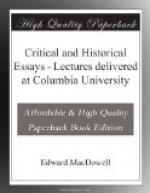To sum up. We may regard rhythm as the intellectual side of music, melody as its sensuous side. The pipe is the one instrument that seems to affect animals—hooded cobras, lizards, fish, etc. Animals’ natures are purely sensuous, therefore the pipe, or to put it more broadly, melody, affects them. To rhythm, on the other hand, they are indifferent; it appeals to the intellect, and therefore only to man.
This theory would certainly account for much of the potency of what we moderns call music. All that aims to be dramatic, tragic, supernatural in our modern music, derives its impressiveness directly from rhythm.[01] What would that shudder of horror in Weber’s “Freischuetz” be without that throb of the basses? Merely a diminished chord of the seventh. Add the pizzicato in the basses and the chord sinks into something fearsome; one has a sudden choking sensation, as if one were listening in fear, or as if the heart had almost stopped beating. All through Wagner’s music dramas this powerful effect is employed, from “The Flying Dutchman” to “Parsifal.” Every composer from Beethoven to Nicode has used the same means to express the same emotions; it is the medium that pre-historic man first knew; it produced the same sensation of fear in him that it does in us at the present day.
Rhythm denotes a thought; it is the expression of a purpose. There is will behind it; its vital part is intention, power; it is an act. Melody, on the other hand, is an almost unconscious expression of the senses; it translates feeling into sound. It is the natural outlet for sensation. In anger we raise the voice; in sadness we lower it. In talking we give expression to the emotions in sound. In a sentence in which fury alternates with sorrow, we have the limits of the melody of speech. Add to this rhythm, and the very height of expression is reached; for by it the intellect will dominate the sensuous.
[01] The strength of the “Fate” motive
in Beethoven’s fifth
symphony undoubtedly
lies in the succession of the four
notes at equal intervals
of time. Beethoven himself
marked it So pocht
das Schicksal an die Pforte.
II
Origin of song vs. Origin of instrumental music
Emerson characterized language as “fossil poetry,” but “fossil music” would have described it even better; for as Darwin says, man sang before he became human.
Gerber, in his “Sprache als Kunst,” describing the degeneration of sound symbols, says “the saving point of language is that the original material meanings of words have become forgotten or lost in their acquired ideal meaning.” This applies with special force to the languages of China, Egypt, and India. Up to the last two centuries our written music was held in bondage, was “fossil music,” so to speak. Only certain progressions of sounds




